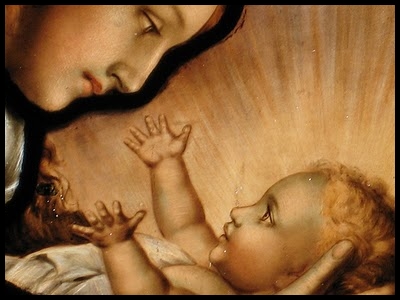
Repetition and Superstition?
Perhaps some Protestant readers of this blog might look askance at yesterday's description of praying St. Andrew's Novena 15 times each day until Christmas Eve. Looking back to the times when we were still Protestants, we recall that this kind of thing would certainly have been scoffed at as some kind of superstitious practice.
However, as with so many Protestant misconceptions about the Catholic Faith, nothing could really be further from the truth.
Cold Reality
Anyone who sincerely prays those 15 prayers each day, with attention and devotion, will soon find that, far from being a merely formulaic repetition of words, they enable the realities of the Incarnation to enter very deeply into the psyche.
In particular, the harsh realities surrounding Christ's humble birth, in a lowly manger and during the bitter cold of night, penetrate especially deeply with the repeated reflections on the ''piercing cold'' of that night in Bethlehem.
Pray it often enough, with sufficient assiduity, and you may even begin to feel that icy chill in your own bones.
Aleksandr Solzhenitsyn's classic, A Day in the Life of Ivan Denisovich, is so sharp in its depiction of the Gulags during the Siberian winters, that just seeing the grey spine of that book on a shelf can even make you feel cold years after having read it.
The repeated prayers of St. Andrew's Novena can help us to have a similarly vivid response to the Nativity crib scene at Christmas; moving us beyond a merely comfortable piety to a hopefully more fruitful contemplation of what Jesus really endured for our sakes from the very beginnings of the Incarnation.Â
Then, too, the word ''piercing'' has a way of, not only making that reality vividly present to the soul, but also of pointing us on toward those cruel nails that would later pierce Our Lord's very hands and feet on the Cross of Calvary.
And by reflecting on the tiny infant Christ's hands and feet, and the way they will later be pierced on the Cross, you might just find sin becoming that bit more distasteful.Â
A Moment in Time
Another way that the frequent repetition of this prayer, offered throughout each of the days in Advent, can allow the deepest realities to enter into one's mind and heart, is that it brings home very clearly the fact of the Incarnation as an event that really happened in time and space.
We see this particularly with the phrase ''Hail and blessed be the hour and moment'' in the very first line of the novena prayer.
Of course, the distinct moment at which the Incarnation began occurred when the Holy Spirit overshadowed Our Lady after She gave her total fiat to God at the Annunciation. Then again, there is the subsequent distinct moment of Christ's birth among us at Bethlehem.
Repeating this prayer so many times each day in Advent can focus us on this portentous moment in salvation history.
More than that, it can help us to prepare for the Christ-Child becoming present to us through the distinct ''moment'' of the Sacred Liturgy at Christmas.
Then too, the repeated focus on the hard facts of the reality of this unique moment can also help us to recognize the importance of every moment in which Christ desires to come to us; and for us to be present to Him in kind.
It really is, as the great 18th-Century writer Fr. Jean-Pierre De Caussade and more recently the Secular Franciscan missionary-helper John Bradburne used to say, the case that every single moment is like a sacrament of the present moment, in which we can encounter Christ as being very near to us.
Openings for Contemplation
In 1 Thessalonians 5:17, St. Paul teaches us that we must pray at all times without ceasing. Teaching on this theme, the Catechism of the Catholic Church reminds us: ''But we cannot pray 'at all times' if we do not pray at specific times, consciously willing it. These are the special times of Christian prayer, both in intensity and duration'' (CCC 2697).
What is praying the St. Andrew's Novena prayer 5 times with each of 3 meals each day - to make 15 times per day - if not an example of setting aside such special times for prayer that is consciously willed?
If prayed with attention and devotion, the repetition of the St. Andrew's Novena prayer is no mere superstitious practice; but can rather become an opening for contemplation of the Incarnation to take root and grow.
Put simply in contemporary terms: Eat. Pray. Repeat.



